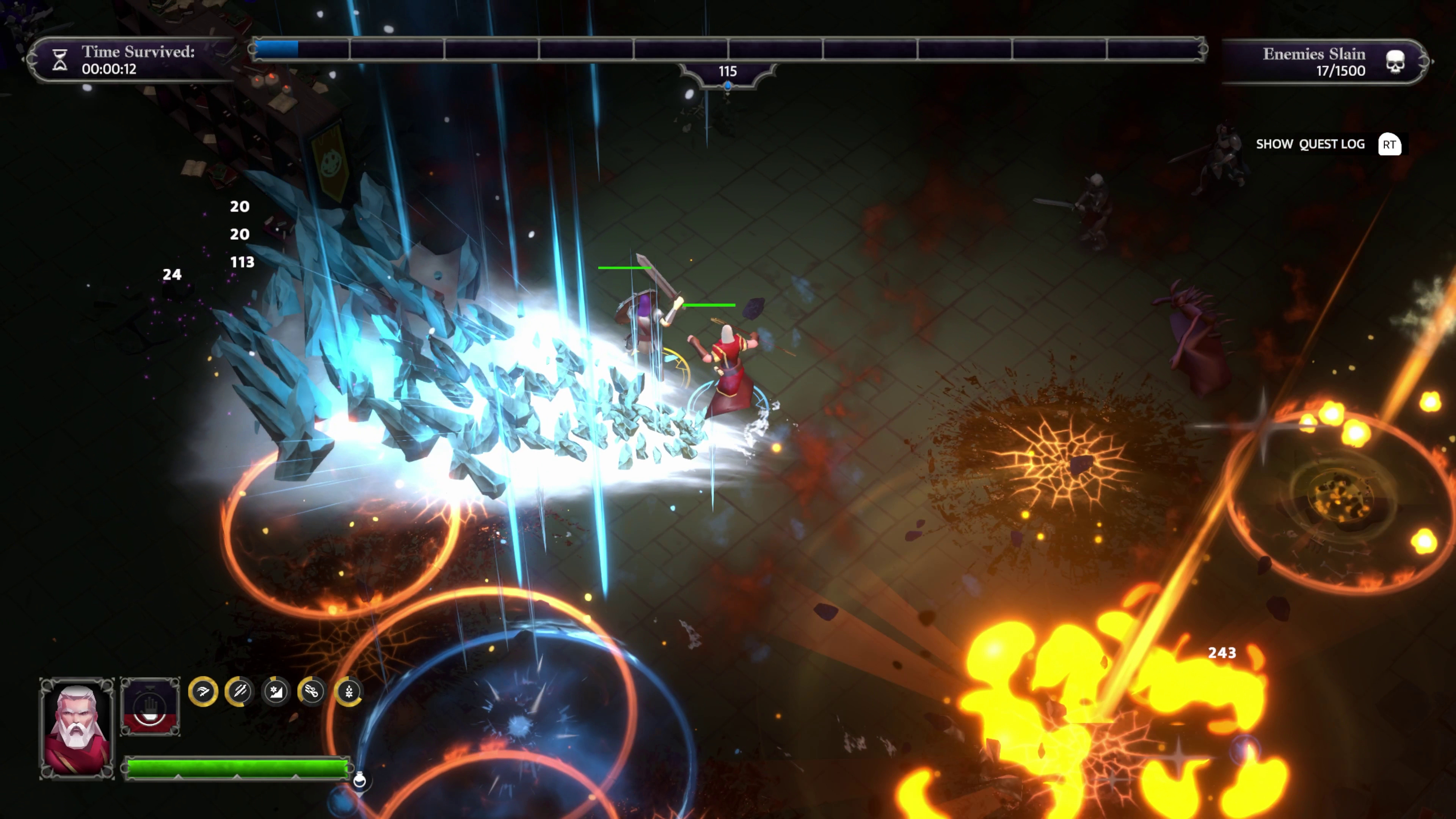Paizo’s Pathfinder, once nakedly a Dungeons and Dragons clone and now fully fledged fantasy property of its own, has been featured in some of the sneakily best roleplaying games of the past few years. Kingmaker and Wrath of the Righteous were stiff competition for Pillars of Eternity in the truly traditional CRPG space, but unlike other tabletop games that have bullied their presence into the video game space (see: Warhammer), Pathfinder seems content in sticking to one genre. But of course, a trend like the idle survivor game, started by indie darling Vampire Survivors, is too tempting to let pass by without throwing your own iteration into the mix.
I don’t mean that to say that Gallowspire Survivors is just another clone. There are a great deal of We-Have-Vampire-Survivors-At-Home available today, but BKOM Studios is a part of that second wave that comes in the wake of a big trend, attempting to iterate on the concept in a meaningful way.

Gallowspire’s biggest difference comes from its characters. The three available, a brawny knight, a shifty rogue, and the sharp mage, all have different modes of offense. Whereas VS’s collection of offense is largely based on their items, and each item can be wielded by any of its characters, the spells that your mage casts and the weapons your fighter swings can’t be interchanged. Passive abilities, like increasing the frequency of potion drops, can be found during any given session by any character, but they don’t guide your playstyle nearly as much as your four big attacks you collect on your way.
This is where lots of reps and a bit of luck really pay off. Knowing what kinds of abilities gel with each other, as well as knowing what kind of threats you will face along the way, really directs builds. I found the most dramatic range of skills in the mage, who can do just about everything from blast random spots of the screen with relentless meteors to slow down hordes of enemies with cones of frost, just not all at once. With them, you spend most of your time balancing the element of randomness–many of your spell choices target zones and not specific enemies–against the sheer power they can produce after just a few upgrades. I cared way more about my character selection in the early game in Gallowspire than any other VS-like i’ve played.

Experience and currency earned by progressing in each run can be spent on talents and skill points that further augment your characters. Investing points in certain skills like strength and constitution raises your melee strength and health, just like in the tabletop Pathfinder system. I didn’t notice much of an impact in this investment outright, but that opposite was true with talents that can augment all weapons and abilities far more meaningfully. Even small dips into certain talents can change your gameplan, like giving the fighter a passive parry. Even the ones that don’t have hard effects immediately can be useful with more investment, like the rogue’s passive dodge. Although it seems like you could potentially invest into these indefinitely so long as you have the points, getting the points takes a lot of work. You’ll be forced to make decisions early that can funnel you into one style of play. For example, you can invest in strengthening the non-damage effects of each type of elemental attack, but you’ll get the most bang for your buck by focusing on one instead of all three.
Actually delving into the dungeon to do all the surviving is where things are the most similar to every other VS-like around. You skate around, attacks pinging off at regular intervals, colliding with waves of very samey enemies. When challenging ones arrive, they often spike the difficulty in a major way, like a skeleton mage who summons circles of fiery skulls that follow you until they die or connect with your face. The one big difference–that you can bring an NPC ally into the crypts with you–doesn’t feel very consequential after a while. They’re good to put between you and the enemy, especially if they’re the fighter, but they don’t noticeably grow in strength at all, and get outclassed and overpowered as soon as things get hairy on the deeper floors. At an early glance, Gallowspire Survivors is an interesting permutation of the idle survivor game. It has just enough new ideas, in its varied character offense and deep meta progressions, to make a case for itself next to the growing numbers of its kin. I think it falls short of being a completely fresh take on the idea, but there’s a few tricks in its bag that, if built upon, could develop into a strong foundation of the next step in this genre. It also makes for a solid new entry in a slow-to-arrive-but-welcome fantasy franchise not called Dungeons and Dragons.
Gallowspire Survivors released in Steam Early Access August 14th






